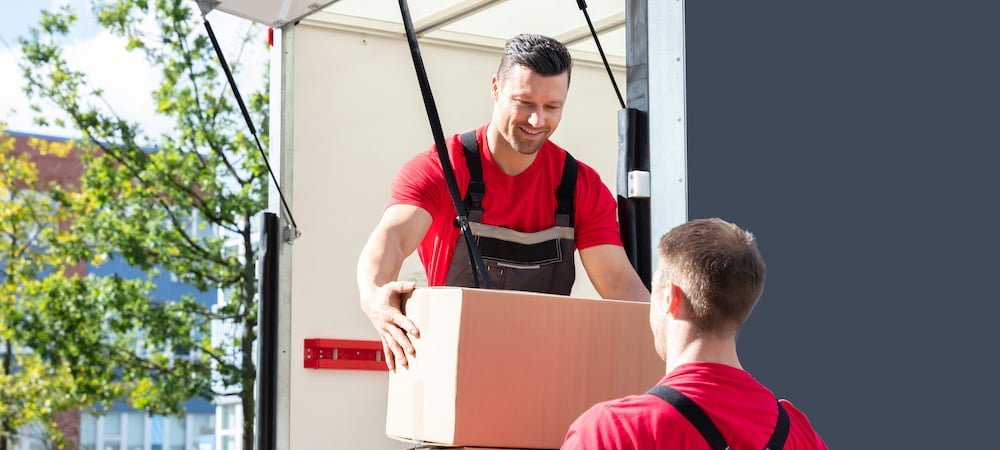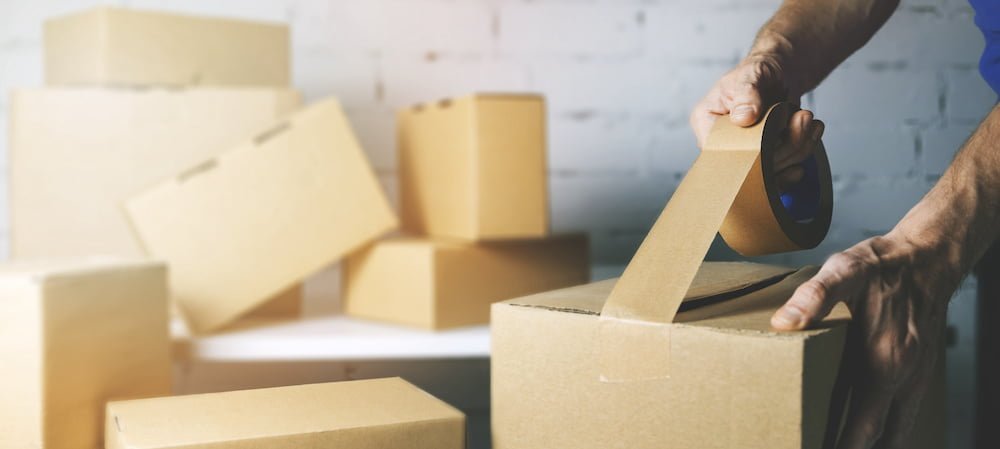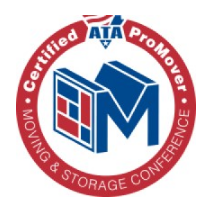Moving Companies That Pack: Services, Costs & How It Works

Moving can be a challenging task, but understanding how moving companies operate can make the process more manageable and less stressful.
Professional movers offer a range of services, from full-service options that handle everything to labor-only choices that provide flexibility, all designed to streamline your relocation experience.
Exploring professional movers reveals the extent of their packing assistance and how they can transform your moving day. Whether you’re planning a local or long-distance relocation, knowing what to expect from moving companies helps you make informed decisions about your move.
From initial consultations to final steps, experienced moving teams provide customized services to meet specific relocation requirements.
Understanding the types of services available, including packing options, cost considerations, and what to expect on moving day, empowers you to choose the right moving company for your unique situation.

Understanding how moving companies operate can help you make informed decisions about your relocation. Let’s explore the types of services offered and the step-by-step process of a professional move.
What Do Moving Companies Do? Complete Service Overview
Moving companies provide comprehensive relocation services that go far beyond simply transporting your belongings from one location to another. Professional movers offer a range of services including packing, loading, transportation, unloading, and unpacking. They bring expertise in proper handling techniques, specialized equipment, and efficient logistics management to ensure a smooth moving experience.
Modern moving companies have evolved to become full-service relocation partners, capable of handling everything from basic furniture moving to complex corporate relocations. They employ trained professionals who understand the intricacies of protecting valuable items, navigating challenging spaces, and managing time-sensitive moves. Their services can be customized to match your specific needs, whether you require minimal assistance or a complete door-to-door solution.
The scope of moving company services typically includes preliminary planning and consultation, providing packing materials and supplies, professional packing services, furniture disassembly and reassembly, loading and unloading, transportation, and even storage solutions if needed. Many companies also offer specialized services for unique items such as pianos, artwork, or antiques.
Core Moving Company Services
Professional moving companies typically offer several essential services as part of their standard packages. These include:
The loading and unloading process involves careful handling of items using proper equipment and techniques. Movers use dollies, furniture blankets, and straps to ensure safe transport. They’re trained in proper lifting techniques and space optimization to maximize efficiency and minimize the risk of damage.
Transportation services include not just the physical movement of goods but also route planning, tracking, and scheduling. Modern moving companies utilize GPS tracking and logistics software to ensure timely delivery and provide updates throughout the journey.
Additional Services and Specializations
Beyond core moving services, many companies offer specialized solutions to meet specific customer needs. These might include:
Custom crating for valuable items, climate-controlled storage facilities, and specialized handling for delicate electronics or medical equipment are just some examples of these additional services. Companies may also provide post-move support such as debris removal, basic furniture arrangement, and connection of appliances.
Types Of Moving Services
Moving companies offer a range of services to cater to different needs and budgets. Consider comparing self-service and full-service movers to determine which option best suits your requirements.
- Full-Service Movers: These companies handle every aspect of your move, from packing and loading to transportation and unpacking. They provide all necessary materials and equipment, making the process hassle-free for you.
- Labor-Only Movers: If you prefer to handle some aspects of the move yourself, labor-only movers offer flexibility. They can assist with specific tasks like loading and unloading, while you manage other aspects such as packing or transportation.
- Shipping Companies: These are ideal for small, long-distance moves and require you to bring your items to their facility. While cost-effective, this option may not be suitable for large or heavy items.
How Moving Companies Work: The Process From Start To Finish
A professional home moving experience typically follows a structured process to ensure efficiency and safety. Understanding this process can help you prepare and set realistic expectations for your move.
Initial Consultation and Quote
The moving process begins with an initial consultation. Many companies now offer virtual surveys using AI technology to assess your belongings and provide accurate quotes.
Planning and Preparation
Once you’ve chosen a moving company, they’ll work with you to create a personalized moving plan. This includes scheduling, addressing special requirements, and discussing packing options.
Packing and Loading
Professional movers are trained to pack items safely and efficiently. They use appropriate materials to protect your belongings during transit.
If you opt for full packing services, the movers will handle everything from fragile items to large furniture. For those who prefer to pack some items themselves, partial packing services are also available.
The duration of a move, including packing, varies depending on the size of your home and the number of items. Professional movers can typically pack a three-bedroom house in about 6-10 hours.
Transportation and Delivery
During transportation, many companies offer tracking services so you can monitor your shipment’s progress. Upon arrival at your new home, the movers will unload your belongings and, if requested, help with unpacking and furniture assembly.
Post-Move Support
After the move, reputable companies offer post-move support. This may include assistance with unpacking, removal of packing materials, and addressing any concerns. Don’t forget to consider the time to forward mail to your new address as part of your post-move tasks. Clear communication with your chosen moving company is key to a successful move.
Packing Services Offered By Moving Companies
Relocating can be a challenging task, especially when packing your belongings. Many reliable furniture movers offer a range of packing services to suit different needs and preferences, making your move smoother and more efficient.
Full Packing Service
Our full packing service is the most complete option available from moving companies. Professional packers handle all aspects of packing your belongings, providing all necessary materials and using efficient techniques to ensure the safety of your items during transit.
- Movers supply boxes, tape, and protective wrapping
- Labeling and inventory management for easy unpacking
- Typical timeframe: 6-10 hours for a three-bedroom house
This service is ideal for those with busy schedules or those who prefer a hands-off approach to moving.
Partial Packing Service
Partial packing services offer flexibility for those who want a balance between professional assistance and personal involvement. You choose which items or rooms you want the movers to pack, allowing for a cost-effective solution that still benefits from professional expertise.
- Professional packing for challenging items like artwork or electronics
- Option to purchase packing materials from the moving company
- Allows you to pack personal or sensitive items yourself
This option is perfect for those who want to save money while still receiving help with difficult-to-pack items.
Fragile-Only Packing
Some moving companies offer specialized packing services for delicate or valuable items. This service provides expert handling of fragile items like glassware, china, and antiques, using specialized packing materials and techniques for maximum protection.
Professional movers have specific techniques for packing glasses for a move, ensuring they arrive intact at your new home. They can also handle unique challenges like transporting a fish tank, which requires special care and expertise.
Unpacking Services
Many moving companies extend their services to include unpacking at your new location. This service typically includes efficient unpacking of boxes, placement of items in designated areas, and assembly of furniture that was disassembled for the move.
- Removal of packing materials and boxes
- Option for basic organization of items in cabinets and closets
Unpacking services can significantly reduce the stress of settling into your new home, allowing you to focus on other aspects of your move.
Specialized Packing for Long-Distance Moves
For long-distance relocations, moving companies often provide additional packing services. These may include extra protective measures for items that will be in transit for extended periods and climate-controlled storage options for sensitive items.
- Detailed inventory and tracking systems for peace of mind during the move
- Custom crating for valuable or fragile items
By understanding these packing services, you can choose the option that best fits your needs, budget, and moving timeline. Whether you opt for full-service packing or decide to handle some aspects yourself, professional movers can provide the support and expertise needed to ensure your belongings arrive safely at your new home.
Do Movers Pack For You? What To Expect
When you’ve decided to let professional movers handle the packing process, it’s natural to wonder what the experience will be like. Understanding what to expect can help you prepare and ensure a smooth packing day.
Pre-Packing Assessment
Before the packing team arrives, you’ll typically need to prepare your home. This includes decluttering, deciding which items to keep, donate, or discard, and creating a list of items that require special attention or handling.
Set aside valuables, important documents, and essentials you’ll need immediately after the move. Create clear pathways and ensure easy access to all rooms and storage areas to assist with the packing process.
The Packing Process
On packing day, the team will arrive at the scheduled time and conduct a walk-through of your home. They’ll assess the scope of work, confirm any special instructions, and bring all necessary packing materials and equipment.
The packing process is typically systematic, starting with less-used rooms and ending with the kitchen. Expect efficient wrapping and boxing of items using appropriate materials, with boxes labeled according to contents and destination rooms.
Materials Used By Professional Packers
Professional movers use high-quality packing materials to ensure the safety of your belongings. These may include sturdy boxes of various sizes, bubble wrap, packing paper, foam sheets, and specialized containers for delicate items.
For furniture and large appliances, they often use moving blankets, plastic wrap, and custom crating for extra protection. The use of professional-grade materials helps minimize the risk of damage during transit.
Efficiency And Time Management
The duration of the packing process depends on several factors, including the size of your home, volume of belongings, and complexity of items to be packed. On average, packing a three-bedroom house typically takes 6-10 hours with a team of 3-4 packers.
Professional movers are trained to work efficiently while ensuring the safety of your possessions. They follow a structured approach, often tackling one room at a time to maintain organization and speed.
Communication And Supervision
Throughout the packing process, the team leader will be your point of contact for questions or concerns. While you’re welcome to supervise, it’s not necessary to hover over the packers.
Clear communication is key, so don’t hesitate to provide any last-minute instructions or changes. The packing team will appreciate your input to ensure they meet your specific needs and preferences.
Quality Control And Inventory
Before finishing, the packing team will conduct a final walk-through to ensure nothing is missed. They’ll complete an inventory of packed items and provide you with a copy of the list.
This step is crucial for keeping track of your belongings and ensuring everything arrives at your new home. Take this opportunity to address any final questions or concerns you may have about the packing process or the upcoming move.
Clean-Up And Preparation For Moving Day
After packing is complete, the team will clean up any packing debris and ensure packed boxes are properly stacked and ready for loading. If moving day is scheduled for a different date, you’ll receive instructions on how to prepare for the upcoming relocation.
This final step helps streamline the moving process and ensures your home is left in good condition after the packing is done. With professional packers, you can enjoy a stress-free packing experience and focus on other aspects of your move.
Items Movers Won’t Pack: Limitations And Exceptions
Professional moving companies handle a wide range of items, but certain things are off-limits due to safety, legal, or practical reasons. Understanding these limitations will help you plan your move more effectively and avoid any last-minute surprises.
Hazardous Materials
Movers are prohibited from packing and transporting hazardous materials for safety reasons. These include:
- Flammable items (gasoline, propane tanks, lighter fluid)
- Explosives (fireworks, ammunition)
- Corrosive substances (acids, car batteries)
- Chemicals (pesticides, fertilizers, cleaning products)
Perishables
Most moving companies have restrictions on perishable items. They typically won’t pack:
- Fresh food items
- Frozen foods
- Refrigerated goods
- Plants (due to potential pest issues and state regulations)
Valuables and Important Documents
For security reasons, movers generally advise against packing certain valuable items. It’s best to transport these yourself:
- Cash and jewelry
- Important documents (passports, birth certificates, financial records)
- Irreplaceable items (family heirlooms, photo albums)
Personal and Sentimental Items
While movers can handle unboxed items, they often recommend that you pack and transport certain personal items yourself. These include:
- Medications
- Personal hygiene products
- Items of high sentimental value
Pets
Moving companies do not pack or transport live animals. You’ll need to make separate arrangements for your pets.
Illegal Items
Anything prohibited by law cannot be packed or transported by moving companies.
Exceptions and Special Considerations
Some moving companies may offer exemptions or special services for certain items. These can include:
- Climate-controlled transport for temperature-sensitive items
- Custom crating for valuable artwork or antiques
- Special handling for musical instruments
Always communicate with your moving company about any unique or valuable items you need to move. They can advise you on the best approach or recommend specialized services if needed.
Preparing for Items Movers Won’t Pack
To handle items that movers won’t pack, consider the following steps:
- Create a separate “do not pack” area in your home
- Plan to transport these items yourself or make alternative arrangements
- Dispose of hazardous materials properly before the move
- Consider donating perishables or plants to friends or neighbors
By being aware of these limitations and planning accordingly, you can ensure a smoother moving process. Remember, when in doubt, always ask your moving company about their specific policies regarding items they will and won’t pack or transport.
Cost Considerations For Packing Services
Understanding the costs associated with packing services is crucial when budgeting to move out. Professional packing can significantly ease the moving process, but it’s important to weigh the benefits against the additional expenses.
Factors Affecting Packing Costs
Several factors influence the cost of professional packing services:
- Volume of items to be packed
- Type and fragility of belongings
- Distance of the move
- Time of year (peak moving seasons may have higher rates)
- Additional services required (e.g., custom crating for artwork)
Comparing DIY Packing Vs. Professional Services
Deciding between DIY packing and professional services involves considering both cost and convenience.
DIY Packing:
- Lower upfront costs
- More time-consuming
- Requires purchasing packing materials
- Risk of improper packing leading to damage
Professional Packing:
- Higher upfront costs
- Saves time and reduces stress
- Includes packing materials
- Expertise in handling delicate items
For those opting for DIY, following essential packing tips for moves can help ensure a smoother process.
Average Costs for Professional Packing
While costs vary, you can expect:
- $25-$60 per hour per packer
- $270-$2,200 for packing an entire home (varies by size)
- Additional costs for specialty items or custom crating
Cost-Saving Strategies
To optimize your packing budget:
- Declutter before the move to reduce the volume of items
- Pack non-fragile items yourself
- Compare quotes from multiple moving companies
- Consider a hybrid approach: professional packing for fragile items, DIY for the rest
- Schedule your move during off-peak seasons for potential discounts
Hidden Costs to Consider
Be aware of potential additional expenses:
- Packing material costs (if not included in the service)
- Insurance for valuable items
- Storage fees if there’s a gap between moving out and in
- Tipping movers for their services
Evaluating Value for Money
When assessing whether professional packing is worth the cost, consider the value of your time, the importance of protecting your belongings, your physical ability to handle packing, and the complexity of your move.
For those with a limited budget, it’s worth exploring if moving out with $5000 is feasible, which may influence your decision on packing services.
Getting Accurate Quotes
To ensure you receive accurate cost estimates:
- Provide a detailed inventory of items to be packed
- Be clear about any special requirements or valuable items
- Ask for a breakdown of costs, including materials and labor
- Inquire about any potential additional fees
By carefully considering these cost factors and your personal needs, you can make an informed decision about whether to invest in professional packing services for your move. Remember, while the upfront cost may be higher, the time saved and potential reduction in stress can make it a worthwhile investment for many movers.
Preparing For Professional Packers
Proper preparation ensures a smooth and efficient packing process when enlisting the help of professional packers. Several key steps can help you make the most of your professional packing service.
Creating an Inventory
Before the packers arrive, take these essential steps:
- Make a detailed list of all items to be packed
- Identify valuable or fragile items that need special attention
- Note any items you plan to pack yourself or transport separately
Decluttering and Organizing
Streamline the packing process by:
- Sorting through belongings and deciding what to keep, donate, or discard
- Organizing items by category or room
- Removing any items you don’t want packed or moved
Communicating with the Packing Team
Ensure clear communication by:
- Discussing any specific packing requirements or preferences
- Pointing out items that need special care or handling
- Clarifying which areas or items should not be packed
Preparing Your Home
Make your home packer-friendly:
- Clear pathways for easy movement
- Remove obstacles that might impede the packing process
- Secure pets in a safe area to avoid disruptions
Safeguarding Valuables and Important Documents
Protect your most important possessions:
- Set aside essential documents, jewelry, and small valuables
- Consider transporting these items yourself
- Inform the packing team about any high-value items that require extra protection
Labeling and Categorizing
Assist in the organization process:
- Pre-label rooms in your new home to guide movers
- Use color-coding or numbering systems for easy identification
- Clearly mark boxes containing essential items you’ll need immediately upon arrival
Preparing Appliances and Electronics
Ensure proper handling of your devices:
- Disconnect and clean appliances before the packers arrive
- Back up important data on computers and other devices
- Gather all cords, remotes, and accessories for each item
Planning for Packing Day
Optimize the packing day experience:
- Clear your schedule to be available for questions or decisions
- Arrange for childcare or pet care if needed
- Prepare refreshments for yourself and the packing team
Understanding Packing Materials and Techniques
Familiarize yourself with:
- Different types of packing materials used by professionals
- Special packing techniques for fragile or unusual items
- How to identify properly packed boxes
By following these preparation steps, you’ll create an environment that allows professional packers to work efficiently and effectively. This preparation not only speeds up the packing process but also helps ensure that your belongings are packed securely for their journey to your new home.
Remember, the more organized you are before the packers arrive, the smoother and less stressful your moving experience will be. Preparing for a move involves careful planning and attention to detail, but the effort pays off in a well-executed relocation.
Unpacking Services: The Final Touch
After the excitement of moving day, the task of unpacking can feel overwhelming. Many moving companies offer unpacking services as part of their moving packages, providing a final touch that can make your new house feel like home in no time.
What Unpacking Services Include
Professional unpacking services typically cover a range of tasks to help you settle in quickly. These include removing items from boxes and placing them in designated areas, assembling furniture that was disassembled for the move, and disposing of packing materials and empty boxes.
Benefits of Professional Unpacking
Opting for unpacking services can offer several advantages:
- Time-saving: Quickly settle into your new home without spending days unpacking
- Stress reduction: Eliminate the overwhelming feeling of facing numerous boxes
- Proper handling: Ensure fragile items are unpacked safely by experienced professionals
- Immediate functionality: Have essential rooms set up and ready to use on day one
Customizing Your Unpacking Experience
You can tailor the unpacking service to your specific needs and preferences. Choose specific rooms or areas for professional unpacking, decide on the level of organization you prefer, and communicate any special instructions or preferences to the unpacking team.
Preparing for Unpacking Services
To make the most of professional unpacking, consider creating a floor plan or sketch of where you want furniture and major items placed. Be present to guide the unpacking team and answer questions, and identify priority items or rooms that should be unpacked first.
What to Expect During the Unpacking Process
The unpacking process typically follows these steps:
- Placement of furniture according to your instructions
- Unpacking of essential items and rooms (e.g., kitchen, bathrooms, bedrooms)
- Systematic unpacking of remaining boxes
- Basic organization of items as they are unpacked
- Removal and disposal of packing materials
After the Unpacking Service
Once the professionals have finished, conduct a walk-through to ensure everything is in its place. Check for any items that may need additional organization and confirm all packing materials have been removed and disposed of properly.
Cost Considerations
Several factors influence the cost of unpacking services. These include the size of your home and number of items, the level of organization requested, and any additional services like furniture assembly or electronics setup.
Maximizing the Value of Unpacking Services
To get the most out of professional unpacking, clearly communicate your expectations and priorities. Use labels and a numbering system to guide unpacking order, and be available to make decisions about item placement and organization.
Unpacking services can transform the final stage of your move into a smooth and efficient transition. By leveraging the expertise of professional movers, you can quickly turn your new house into a functional and organized home, allowing you to focus on settling into your new community and lifestyle.
Choosing The Right Moving Company For Your Needs
Selecting the right moving company is crucial for a smooth and stress-free relocation. With numerous options available, choosing a moving company that aligns with your specific requirements can make all the difference, whether you’re planning a local move or looking for leading long distance movers.
Assessing Your Moving Needs
Before beginning your search, it’s essential to consider several key factors. These include:
- Distance of your move (local, long-distance, or international)
- Volume of items to be moved
- Special items requiring extra care (e.g., antiques, pianos)
- Budget constraints
- Desired level of service (full-service packing, partial packing, or self-packing)
Researching Potential Moving Companies
To find reputable movers, follow these steps:
- Ask for recommendations from friends, family, or real estate agents
- Check online reviews and ratings on trusted platforms
- Verify the company’s licensing and insurance
- Look for memberships in professional moving associations
Comparing Quotes And Services
Once you’ve shortlisted potential movers, take these actions:
- Request in-home estimates from at least three companies
- Ensure each estimate includes a detailed inventory of your belongings
- Compare the services offered and any additional fees
- Understand the cost to hire moving services
- Research the average cost of moving companies to ensure you’re getting a fair price
Understanding Moving Company Policies
Key policies to review include:
- Cancellation and rescheduling terms
- Liability coverage and valuation protection options
- Claims process for damaged or lost items
- Payment terms and accepted methods
Red Flags To Watch Out For
Be cautious of companies that:
- Require large deposits upfront
- Have numerous complaints with the Better Business Bureau
- Provide estimates without conducting an in-home survey
- Use rented trucks or unmarked vehicles
Questions To Ask Potential Movers
Important inquiries to make:
- How long has the company been in business?
- What packing materials do they use?
- Do they subcontract any part of the move?
- What is their policy on items they won’t move?
- How do they handle delays or unforeseen circumstances?
Making Your Final Decision
When deciding on a moving company:
- Trust your instincts about the company’s professionalism
- Consider the overall value, not just the lowest price
- Ensure all agreements are in writing before signing
- Confirm the mover’s availability for your preferred dates
Preparing For Your Chosen Mover
After selecting your moving company, take these steps:
- Schedule your move date well in advance
- Discuss any special requirements or concerns
- Obtain a written copy of your estimate and service agreement
- Prepare a detailed inventory of your belongings
- Arrange for parking permits or elevator reservations if necessary
By carefully considering your needs, thoroughly researching your options, and asking the right questions, you can choose a moving company that will provide a seamless relocation experience. Remember, the cheapest option isn’t always the best; focus on finding a reputable mover that offers the services you need at a fair price.
Frequently Asked Questions
Q: Do moving companies pack for you?
A: Yes, most professional moving companies offer comprehensive packing services where they will pack all your belongings for you. These services can include full-house packing, partial packing, or fragile-only packing options, with trained professionals using high-quality packing materials and efficient techniques to ensure your items are properly protected.
Q: Do moving companies provide boxes and packing materials?
A: Yes, moving companies typically provide all necessary packing materials including boxes, tape, bubble wrap, packing paper, and specialized containers. While these materials usually come at an additional cost, they are professional-grade supplies that offer better protection than standard retail boxes and can be included in your overall moving quote.
Q: How far in advance should I book a moving company with packing services?
A: Booking a moving company with packing services is best done 4-6 weeks in advance for local moves and 6-8 weeks for long-distance moves. During peak moving seasons (summer months and weekends), it’s advisable to book even earlier to ensure availability.
Q: Can I pack some items myself and have the movers pack the rest?
A: Most moving companies offer flexible packing options, allowing you to pack some items yourself while they handle the rest. This partial packing service can be customized to your preferences, so be sure to communicate your needs clearly when obtaining a quote.
Q: Do moving companies provide packing materials, or should I purchase them separately?
A: Full-service moving companies typically include all necessary packing materials as part of their service. For partial packing or self-packing, you may need to purchase some materials separately, though many moving companies also offer packing supplies for sale.
Q: How long does it typically take for movers to pack an entire house?
A: The packing time varies depending on the house size and number of items. Here’s a general guideline:
- 1-2 bedroom apartment: 2-4 hours
- 3-4 bedroom house: 6-10 hours
- 5+ bedroom house: 10-12+ hours
Professional movers work efficiently, often completing the task faster than if you were to pack yourself.
Q: Is it customary to tip movers who also provide packing services?
A: Tipping movers, including those who provide packing services, is customary and appreciated for their hard work. A typical tip ranges from 5% to 20% of the total moving cost, depending on the quality of service. For exceptional service, consider tipping $4-$5 per hour per mover or $20-$40 per mover for a full day’s work.
Conclusion
Moving companies offer a range of services designed to simplify your relocation process, from full-service options that handle everything to more flexible arrangements that cater to specific needs. Professional packing services stand out as a valuable offering, providing expertise in safely securing your belongings for transport.
These services not only save time but also ensure that your items are protected using proper techniques and materials. While the convenience of professional packing is undeniable, it’s crucial to select a moving company that aligns with your unique requirements.
Consider factors such as the company’s reputation, range of services, and cost when making your decision. Ultimately, the choice between self-packing and professional packing depends on your budget, time constraints, and the complexity of your move.
By carefully weighing these factors, you can make an informed decision that ensures a smooth, efficient, and stress-free moving experience suited to your specific situation. Remember, the right moving company can make all the difference in transforming a potentially overwhelming process into a manageable and even positive experience.
Related Articles
Where to Move from Texas: Top 10 States for Ex-Texans in 2025

Where to Move from Texas: Top 10 States for Ex-Texans in 2025 Record numbers of Texans are exploring life beyond state lines, driven by soaring housing costs, evolving career landscapes, and the search for new lifestyle opportunities. The decision to leave Texas stirs intense emotions – after all, the Lone Star State‘s unique culture and […]
Read MoreHow to Move a House from One Location to Another: Planning to Completion

Relocating an entire house might seem like something out of a movie, but this remarkable feat of engineering happens more often than you’d think. From preserving historic mansions to saving beloved family homes from coastal erosion, house moving represents the intersection of cutting-edge engineering and practical problem-solving. With project costs typically ranging from $18,000 to […]
Read More




